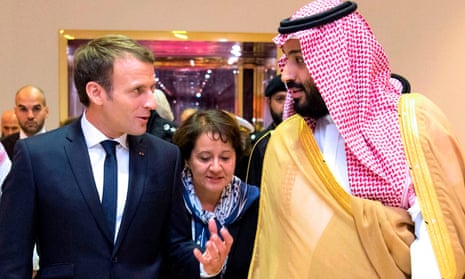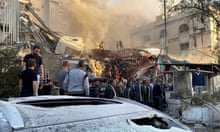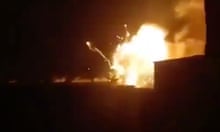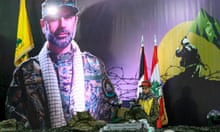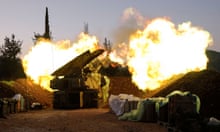Saudi Arabia has ordered its citizens to leave Lebanon immediately, escalating a regional standoff with Iran centred on the fragile state, which it claims is being run by Tehran’s proxy, Hezbollah.
The move follows a week of bellicose rhetoric from the Sunni Arab powerhouse about its Shia rival, drawing strong support from Donald Trump and Israel, all three of whom insist Iran is forging strongholds across the region.
The standoff has taken tensions between Riyadh and Tehran to new levels and raised fears that decades of distrust and manoeuvrings between the two may be building towards a military confrontation, underwritten by the Trump administration and joined by Israel.
The Saudi order for its citizens to leave, also made by the kingdom’s allies in Bahrain and Kuwait, came after the country’s foreign minister, Adel al-Jubeir, said his government would treat Lebanon as a hostile state as long as Hezbollah was in the government. He described Hezbollah’s participation in government as an “act of war” against Saudi Arabia.
The Israeli intelligence minister, Yisrael Katz, said on Thursday he believed conditions were ripe for a diplomatic offensive against Iran and Hezbollah at the United Nations, where he said Israel would seek better enforcement of a 2006 ceasefire agreement that called on Hezbollah to disarm and stay away from its border.
Allegations of a pact, at least on a de facto level, between Saudi Arabia and Israel were given impetus after it was revealed that Israeli diplomats were asked to repeat talking points, almost identical to remarks made by Saudi leaders after Saturday’s resignation of the Lebanese prime minister, Saad Hariri, claiming Hezbollah had made his job impossible.
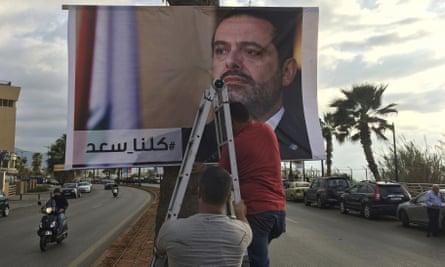
The emergence of the reported memo sent to Israeli missions around the world strongly echoes public statements made by the Israeli prime minister, Benjamin Netanyahu, and his defence minister, Avigdor Lieberman.
Hariri’s departure came at the behest of Saudi leaders, who then launched an unprecedented round of anti-Iran rhetoric, led by Hariri, accusing Hezbollah of dominating life in Lebanon and subverting the political system.
Hariri had led the government in Lebanon for 11 months after five years in exile, mainly in Riyadh. Saudi Arabia was a prominent patron of Hariri, but he had fallen out of favour with his hosts after the collapse of the construction sector, during which a company he chaired, Saudi Oger, incurred large debts.
In the past week, Hariri has acted as an envoy for Riyadh, travelling to Bahrain and Abu Dhabi to discuss his resignation. Lebanese officials’ claims that the former leader is being “held hostage” have been ridiculed by Hariri’s staff and senior Saudis.
Hezbollah’s leader, Hassan Nasrallah, has speculated that Hariri was being held against his will in the kingdom and that it appeared as if Saudi Arabia had forced his resignation.
French President Emmanuel Macron paid an unscheduled visit to Saudi Arabia on Thursday amid the escalating tensions, saying he wanted to “emphasise the importance of Lebanese stability and integrity”.
“My wish is that all Lebanese political officials live freely in Lebanon... which means having a very demanding stance on those who could threaten any leader”, he added.
Asked if Hariri had sought asylum in France, he said: “We’ve not had any requests.”
Saudi Arabia and Israel have no diplomatic ties and successive Saudi leaders have said that will not change unless a settlement is reached with the Palestinians.
In recent months, senior Israeli politicians have spoken frequently about the role of Iran and Hezbollah in Syria and Lebanon, amid a growing conviction that a war with Hezbollah may be inevitable.
Israel has been encouraging the Trump administration to take a tougher stance on Iran, both against the nuclear agreement reached during the Obama administration and the country’s expanding influence. Last month, Trump refused to certify elements of the agreement.
There has also been much discreet shuttle diplomacy in recent months and the Saudi minister for Gulf affairs is travelling to Washington for talks on the standoff. Last month the US president’s son-in-law and adviser, Jared Kushner, traveled to Riyadh for an unpublicised meeting with the Saudi crown prince, Mohammed bin Salman.
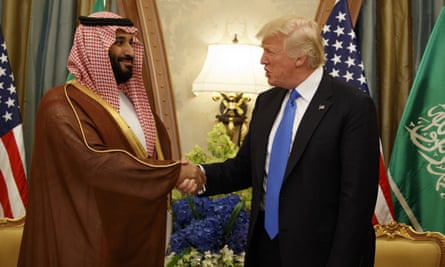
Earlier in the autumn, Israeli officials suggested a senior Saudi official had travelled to Tel Aviv in the first visit of its kind between the two foes. And Netanyahu warned his Russian counterpart, Vladimir Putin, during a meeting that Israel might take unilateral action over Iran’s increasing role to the country’s north.
Netanyahu told the BBC while in London last month: “When Israelis and the Arabs, all the Arabs and the Israelis, agree on one thing, people should pay attention. We should stop this Iranian takeover.”
The political fate of Lebanon has been up for grabs since the end of the civil war nearly 25 years ago, with Iran and Saudi Arabia joining France, the US, Syria and Turkey in trying to shape affairs. However, the main protagonists have long been Riyadh and Tehran, with the latter using Hezbollah to out-muscle the Saudis, who have wielded influence through financial patronage.
Hezbollah has consolidated its position since a brief war with Israel in 2006, and has grown stronger since the formation of Hariri’s government. The president was appointed after nearly two years without a head of state, with the agreement of both capitals. However, since then a political and institutional stalemate has festered.
More importantly, Iran has been expanding its influence in neighbouring states. In Syria it has defended the regime of Bashar al-Assad and, with Russia, helped his forces into a winning position on the battlefield against opposition groups and Islamic State.
Iran has also gained significant influence in Iraq since the US-led ousting of Saddam Hussein. It has moved into the post-Isis vacuum, reinforcing a physical corridor that it aims to complete from Tehran to the Syrian port city of Tartous. The Syrian-Iraqi border is an essential part of this plan, and the clearing of Deir ez-Zor, Mayadin and Bukamal in recent weeks are seen by Iranian officials as strategic steps.
The Iranian president, Hassan Rouhani, accused Saudi officials of making a strategic mistake by considering the US and “the Zionist regime”, Iran’s terminology for Israel, as allies. He said the US and Israel were trying to dominate the region to “plunder its oil and wealth” and that Trump’s administration was “skilful in pickpocketing” Saudi Arabia.
Joseph Bahout, a visiting scholar at the Carnegie Endowment for International Peace, said: “I couldn’t envisage this kind of Saudi show of force towards Iran and Hezbollah without some kind of US and Israeli blessing. I am convinced of this. There is something brewing.
“But the Saudis often misread the signs they are given. Did they get a clear sign or a wink? – and can they tell the difference?”
“Saudi Arabia and Israeli may be strategically aligned, but they’re not tactically aligned,” said Daniel Shapiro, former US ambassador to Israel and now a visiting fellow at the Institute for National Security Studies in Tel Aviv.
“MBS [Mohammed bin Salman] doesn’t do a lot of consulting, even with those who share his interests. He is an impatient man who wants others to respond to his moves rather than do strategic planning.”
Shapiro said that Prince Salman may be seeking to goad Hezbollah into a conflict but it was not clear how the group would respond, and Israel did not appear ready to pick a fight now either.
“Israel has been preparing for the next war against Hezbollah for some time, but has sought to put it off as long as possible,” he said.
The White House, meanwhile, said: “We condemn the Iranian regime’s activities and stand with Saudi Arabia.”
